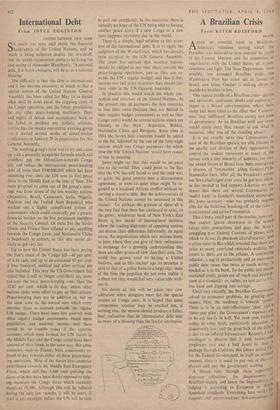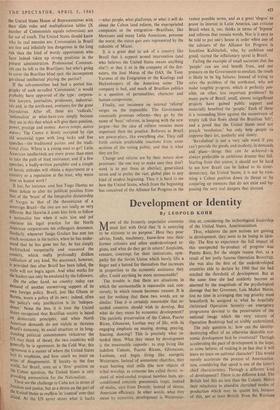A Brazilian Crisis
From KEITH BOTSFORD
BRAZIL
AFTER an eventful week in Brazilian__ American relations, during which the President was believed to have ordered the recall of his Finance Minister and the suspension of negotiations with the United States, all is now sweetness and light. The State Department, most sensibly, has assuaged Brazilian pride; the Washington Post has come out in favour of Brazil; and Jango Goulart is making efforts to muzzle his brother-in-law.
This typical profile of a Brazilian crisis—gloom and optimism, confusion, doubt and euphoria began in a House sub-committee, where testi- mony had been taken tothe effect that 'Commu- nists' had 'infiltrated' Brazilian society and even its government. As no Brazilian with any sense would really deny this, except to ask what it Mattered, whai was all the shouting about?
. It is not exactly news that Communists, at least of the Brazilian species, arc able (thanks to the apathy and division of their opponents) to control the student movement or many of the unions with a tiny minority of activists; nor that the armed forces of Brazil have been undergoing a process of 'renovation' along Goulart-PTB- Nationalist lines. After all, the President's power has been challenged ever since he got into office; he has needed to find support. Likewise no one denies that there are several Communists or 'useful fools' in Goulart's immediate entourage. His press secretary—who was probably respon- sible for the fictitious 'breaking-off' of the talks-- is an avowed and active Communist.
This is but a small part of the trouble, however. One cannot ignore dissension in the armed forces over promotions and pay; the NavY s smuggling past Federal Customs of planes with which to fit out its phantom aircraft-carrier; and a crime wave in Rio which revealed that there are twice as many convicted criminals walking the streets as there are in the prisons. A continuing inflation, a sag in productivity and an enormous public debt mean that twice as much money IS needed as Is. in the bank. To the public this means restricted credit, prices out of reach and devel01- ment at a standstill: or, rather, no new car or 1 V, less food and dipping into savings. Until very recently, the Brazilian Government solved its economic problems by printing neW, money. Now the tendency is towards 'Pions' There is to be an anti-inflationary 'plan' and a 'three-year plan'; the Government's expenses are: to be cut nearly in half. Yet even now Federal. outlay in .some fields, particularly education, i.st disastrously low; and the great bulk of the dericl is due to an inflated bureaucracy. Recently I "13s privileged to observe that it took twenty-one employees two and a half hours to clear_ 3 package through Customs; this labour netted 65,, for the Federal Government, in itself an unusual amount, since it is usual to pay one of the en' ployces and pay the government nothing, 1 A thread runs through these apparel disparate reflections: the shapelessness Brazilian society and hence the impossibility obi judging it according to European or N°I.,_t American standards. Everything here works Of . tangents and approximations. Sub-committees °
the United States House of Representatives with their slide rules and multiplication tables (X number of Communists equals subversion) are far out of touch. The United States should know who its real enemies are. Communists in Brazil are few and infinitely less dangerous in the long run than the kind of wordy opportunists who have indeed taken up strong positions in the present administration. Professional Commun- ists can be left to the Brazilians; but who's going to cover the Brazilian blind spot, the incompetent get-ahead intellectual playing the patriot?
If the sub-committee had had a potted bio- graphy of each so-called `Communist,' it would probably have approved of the type: corpora- tion lawyers, journalists, professors, industrial- ists and, in the north-east, overseers for the great facendeiros. After all, these are 'radicals,' `nationalists' or what-have-you simply because they see in this that which will give them position, Power, prestige and money. Autres temps, autres ma'firs. The Centre is firmly occupied by ripe old senatorial types with long locks and fine speeches—the traditional parties and the tradi- tional elites. Where is a young man to go? Latin American intellectuals are more prone than most to take the path of least resistance; and if a few Speeches, a badly-written pamphlet and a couple of heroic attitudes will obtain a department or a Ministry or a reputation at the least, why waste time on honest work?
It has, for instance, cost San Tiago Dantas no inner debate to alter his political position from that of the 'brain' of the Integralist dictatorship of Vargas to that of the theoretician of a sovereign Brazil—the two are not really so very different. But likewise it costs him little to follow a nationalist line when it suits him and yet continue his legal practice for the North American corporations his colleagues denounce. Similarly, whenever Jango Goulart has met too much resistance in his tactics, when he has under- stood that he has gone too far, he has simply backtracked temporarily and reassured the country, which really profoundly dislikes radicalism of any kind. No assurance, however, IS provided that after Brazil has been lulled, the Cycle will not begin again. And what works for the leaders can only be emulated by the followers.
On the other hand, no country today can demand of another unswerving support of its own foreign policy. Brazil, just like Ghana or Burma, wants a policy of its own : indeed, often the policy's only justification is its 'indepen- dence: None the less, it is time the United States recognised that Brazilian society is based O n democratic principles; and when North American demands do not violate or threaten Brazil's economy, its social structure or its long- standing political commitments (whatever the US may think of these), the two countries will generally be in agreement. In the Cold War, this agreement is a matter of where the United States laYs its emphases, and how much we insist on areas of disagreement. If loyalty to the free World, for Brazil, rests on a 'firm' position on the Cuban question, the United States is only Providing ammunition for the Nationalists.
These see the challenge to Cuba not in terms of t.reedom and justice, but as a desire on the part of the United States to reaffirm its 'control' over that island. As the US never states what it backs —what people, what platforms, or what it will do about the Cuban land reform, the expropriated companies or the emigration—Brazilians, like Mexicans and many Latin Americans, presume the worst; the status quo ante represented by the redoubts of Miami.
It is a great deal to ask of a country like Brazil that it support armed intervention (and who believes the United States means anything else?) or that it sit in the company of the fire- eaters, the Jose' Moras of the OAS, the Tony Varonas of the Emigration or the Keatings and Hickenloopers of the American scene The company is bad, and much of Brazilian politics is a question of personalities, character and human compromise.
Finally, our insistence on internal 'reform' verges on the impossible. The Government constantly promises reforms--they go by the name of 'basic' reforms, in keeping with the new jargon—but the idea of reform remains more important than the practice. Reforms in Brazil are power-plays, like everything else. They call forth certain predictable reactions from some sections of the voting public, and that is what they are for.
Change and reform are by their nature slow processes: the one way to make sure they don't work is to put them in abstract, generalised terms and to prefer the vast, global plan to any kind of modest beginning. Thus it is hard to see how the United States, which from the beginning has conceived of the Alliance for Progress in the
vastest possible terms, and as a great 'slogan' to prove its interest in Latin America, can criticise Brazil when it, too, thinks in terms of 'bigness' and reforms that remain words. Nor is it easy to be told to put one's house in order when one of the advisers of the Alliance for Progress is Juscelino Kubitschek, who, by ambition and greed, started the inflationary spiral in Brazil.
Failing the example of small successes that the 'people' can see and benefit from, and put pressure on the Government to emulate, the result is likely to be big failures. Instead of trying to solve the problem of the north-east, why not make tangible progress, which is perfectly pos- sible, on other, less important problems? In many parts of Brazil, small, almost insignificant projects have gained public support and materially benefited the 'people.' Each of these is a resounding blow against the mainstream of empty talk that flows about the Brazilian 'left'; and a proof that the United States need not preach 'revolution,' but only help people to improve their lot, modestly and slowly.
'Revolution' is not a very safe word if you can't provide the goods, and modesty, in demands and plans—things that can be achieved—is always preferable to ambitious dreams that fail. Starting from this axiom, it should not be hard to see how Brazil can be linked to its sister- democracy, the United States; it is not by ram- ming a Cuban position down its throat or by conjuring up menaces that do not exist and by- passing the very real dangers that abound.



































 Previous page
Previous page